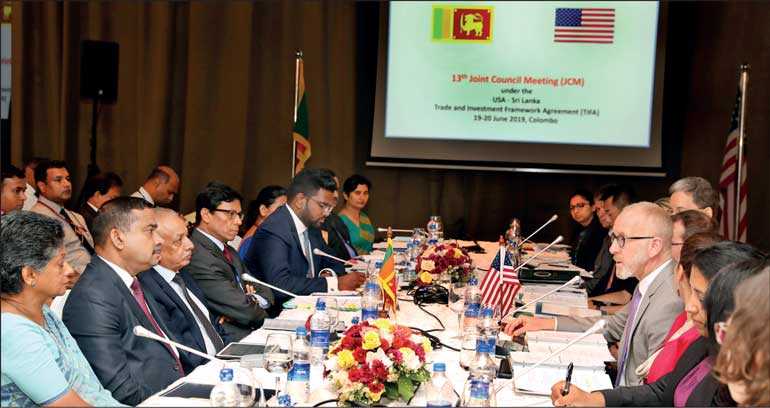Monday Feb 16, 2026
Monday Feb 16, 2026
Wednesday, 3 July 2019 00:00 - - {{hitsCtrl.values.hits}}



By Madushka Balasuriya
Increased transparency in Government procurement procedures, reductions in tariffs on information technology (IT) goods and services to encourage Sri Lanka’s shift towards a digital economy, and the strengthening of intellectual property rights, were some of the key issues discussed at the 13th US-Sri Lanka Trade and Investment Framework (TIFA) Joint Council Meeting on 19 and 20 June in Colombo.
 |
US Trade Representative South and Central Asia Assistant |
“I’m really happy with how the meeting went. The commerce ministry brought participants from across the Government to participate and discuss specific issues. And that was very helpful because we were able to draw on the expertise of officials from the finance ministry, customs service, agriculture and other parts of the Government,” explained Christopher Wilson, the Assistant United States Trade Representative (AUSTR), in a wide-ranging interview with the Daily FT.
The meeting is the first between the two sides since 2016, an occasion which had seen both countries agree to a five-year joint action plan to oversee Sri Lanka’s export-led growth. However since then, the US has seen a change in administration and with it, explained Wilson, a change in the US’s overall approach to trade discussions.
“We really are reorienting our approach to that action plan. That plan, which on our side was developed under our previous administration, was very focused on development. And a lot of the indicators in the plan were derived from traditional indicators of development policy. What we’re trying to do now, is to move this TIFA dialogue into a more traditional space of discussing actual trade policy matters.
“In some ways it’s sort of a false distinction because the trade issues that we’re discussing under this agenda, all relate very directly to advancing development objectives. But we’ve made a decision to focus our trade dialogues on conventional trade policy tools and to make that trade focus relevant to development rather than the other way around.”
Better utilisation of GSP benefits
In that context, discussion centred around Sri Lanka’s ability to better position itself in export markets, while also expanding its basket of goods. At present, nearly 3,500 different products from Sri Lanka are eligible to access the US market on a duty free basis under the Generalised System of Preferences (GSP) scheme.
Wilson however notes that there’s potential for Sri Lanka, which has an unencumbered trade relationship with the US, to capitalise on trade tensions between the US and other nations most notably in relation to goods being supplied under GSP.
“SL already does a pretty good job taking advantage of this program, but we want to make sure that the awareness of these trade preferences is expanded. Currently the product mix that enters the US from Sri Lanka is pretty narrow, so one of the things that we’re discussing is where there maybe potential in other sectors of the SL economy to expand exports into the US market beyond the products that are currently benefitting from GSP.
“Maybe because of the tension that exists in other trading relationships, Sri Lanka might have the potential to maximise its own participation in the system. And to identify products that were previously entering the US under GSP from other countries, and maybe there are possibilities for Sri Lanka to take advantage of that.”
Obstacles to FDI growth
For Sri Lanka, more so than exports, one of the key elements to its economic growth model is bringing foreign direct investment; after years of harbouring debt-driven growth, FDI inflows are now crucial in balancing the books.
For this objective to be reached more efficiently however, Wilson believes Sri Lanka can do more in terms of its compliance with the WTO Agreement on Trade Facilitation and subsequent enforcement in reducing tariff and non-tariff barriers. Chief among which are issues such as the implementation of intellectual property rights (IPR) laws, and the need for more transparent tender procedures.
“SL has a pretty good record of having good legal structures in place for IPR, but this is an area we continue to be engaged in providing assistance to ensure that IP protection is solid,” explained Wilson.
“It’s more about building capacity in terms of enforcement of IPR. The legal framework is already in place.”
“We also hear about from our trading community that it often appears that when the Government is going out with a tender to procure particular goods, the procedural steps for how that process works aren’t always clearly communicated, the timelines aren’t always clear. So it becomes difficult for US companies who may want to participate in that tendering process.
“There are some cases in which we perceive that before a tender is even developed, it is crafted or designed in a way that appears already targeted at a particular supplier. So it restricts the ability of other, potentially more competitive, and more economical suppliers to participate in that tendering process.”
Wilson notes that this is a self-defeating process which undermines Sri Lanka’s ability to procure the ‘highest quality products’ at the best possible prices.
“Our view is having more transparent and open processes for procurement are ultimately to the benefit of the procuring government, because it creates possibilities to procure goods and services at a lower cost and therefore saves the tax payers money. It also ensures the GOSL is procuring the highest quality products.
“We have also seen, and this is not unique to Sri Lanka, that often there is a preference towards working on a government to government basis. There would a preference given to suppliers who are affiliated with governments in the supplying countries. And in our view it limits the possibility for private sector suppliers to come in with actually more competitive and higher quality bids.”
Path to a digital economy
Sri Lanka’s desire to head towards a digital economy has long been touted, with the latest timeline stating that the process will begin sometime in 2019. This is a shared goal for most economies, though Wilson understands that such initiatives require a delicate balance.
This is most notable in the free flow of data across borders, something investors in digital goods and services rely on to a great extent.
“This is an area that I think is evolving very rapidly. For both developing and developed economies, we’re all sort of struggling to identify the right mix of policy measures that can help to promote a thriving digital economy,” he noted.
“It’s our perception that when barriers to cross border data flows are put in place, this really impedes the development of a digital economy. We understand that it is important to strike a balance between that and the effective protection of personal data. And we believe that there are ways to strike that balance.”
Further to this, Wilson and his delegation also suggest that the reduction of traditional trade barriers on hard goods which have ‘relevance to the development of information technology’ could be an ‘easy way’ towards developing a strong digital economy.
“One suggestion we’ve been pursuing for some time is that the Government could become a participant in an existent WTO agreement that establishes duty free treatment for IT products. And again it’s been our observation that countries participating in that scheme do sort of set themselves apart in creating an environment that contributes to a flourishing digital economy. When an economy like SL has an ability to import at a lower cost computer hardware and other IT products that can become sort of the infrastructure for a digital economy, they advance their prospects in that emerging area of economic policy.
“We understand that there are complexities, because signing on to a commitment to duty free treatment in these products, obviously there are revenue implications that have to be taken into consideration. And we understand that requires careful analysis. But this is something that we see to be a potential easy way for Sri Lanka to distinguish itself in a way that will send a signal globally that it is open to the development of a strong digital economy.”
Pix by Lasantha Kumara